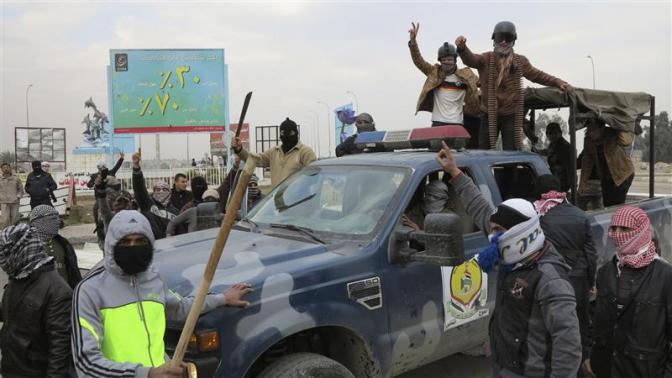www.aljazeerah.info
News, December 2013
Archives
Mission & Name
Conflict Terminology
Editorials
Gaza Holocaust
Gulf War
Isdood
Islam
News
News Photos
Opinion Editorials
US Foreign Policy (Dr. El-Najjar's Articles)
www.aljazeerah.info
|
Editorial Note: The following news reports are summaries from original sources. They may also include corrections of Arabic names and political terminology. Comments are in parentheses. |
13 Iraqis Killed by Police Forces in Ramadi During Break Up of Protest Camp
December 30, 2013
 |
 |
| Iraqi protesters take over a police vehicle in Ramadi, December 30, 2013 |
Fighting erupts as Iraq police break up Sunni protest camp
By Kamal Namaa RAMADI,
Iraq Mon Dec 30, 2013, 2:26 pm EST
(Reuters) -
Fighting erupted when Iraqi police broke up a Sunni Muslim protest camp in the western Anbar province on Monday, leaving at least 13 people dead, police and medical sources said.
The camp has been an irritant to Prime Minister Nuri al-Maliki's Shi'ite Muslim-led government since Sunni protesters set it up a year ago to demonstrate against what they see as marginalization of their sect.
The operation triggered an immediate political backlash as dozens of Sunni lawmakers offered their resignations.
Maliki, who is seeking a third term in April's elections, has repeatedly vowed to remove the camp and accused protesters of stirring strife and sheltering al Qaeda-linked militants (the same excuse used by many world governments to crack down on Muslim protesters).
Violence has spiked this year as militants target the government and anyone seen to be supporting it, raising fears of a return to the sectarian conflict of 2006-7 that killed tens of thousands. Another 11 people died in separate attacks across Iraq on Monday.
Police sources said Monday's clashes broke out when gunmen opened fire on police special forces trying to enter Ramadi, the western city where the protest camp is located.
The gunmen destroyed four police vehicles and killed at least three policemen in the north of Ramadi, one source said.
The bodies of 10 other people killed in the clashes were brought into Ramadi's morgue, hospital and morgue sources said. In Falouja, gunmen attacked army patrols deployed along the main highway leading to Ramadi.
Many Sunnis resent Shi'ite domination of Iraq's politics since the U.S.-led invasion that toppled Saddam Hussein in 2003 and empowered majority Shi'ites through the ballot box.
Shaikh Abdul Malik Al-Sa'adi, an influential Sunni cleric who had called on protesters to remain peaceful, denounced the operation and called on security forces to withdraw immediately to prevent further bloodshed.
Calling Maliki's government a "sectarian government that wants to smash and eradicate the Sunni people in its country", he urged Sunni ministers, parliament members and local officials to resign and boycott the political process.
RESENTMENT
A few hours later, over 40 Sunni lawmakers - a substantial portion of parliament - offered their resignations. Although not effective unless accepted by parliament's speaker, the resignations put further pressure on Maliki.
Prominent Sunni politician Saleh al-Mutlaq called for all lawmakers from the Sunni-backed Iraqiya bloc to withdraw from the political process, saying it had hit a "dead end".
"Elections in this atmosphere would be settled in advance, therefore we should raise our voices high and say the political process cannot proceed in this way," he told reporters.
Tensions have been rising over the past few weeks in Anbar, a province that makes up a third of Iraq's territory and is populated mainly by Sunnis living along the Euphrates River.
The army launched a major operation there to flush out al Qaeda militants after an attack killed at least 18 soldiers including an army commander on December 21.
Then on Saturday security forces arrested a prominent Sunni lawmaker from the Iraqiya bloc in the area after killing his brother in a firefight with his bodyguards.
The incident prompted Saadi, the Sunni cleric, to urge Sunni protesters to "defend themselves".
Elsewhere in Iraq, three separate bombs in Baghdad killed at least eight people, police said. Three policemen were also found dead on the side of a road in the western Abu Ghraib district after gunmen abducted them, police said.
In Tikrit, the deputy governor of Salahuddin province escaped unharmed after a car bomb exploded near his convoy, wounding four of his bodyguards, police said.
At least 10 people were wounded when a car bomb exploded near a Shi'ite mosque in southern part of Kirkuk, police said.
More than 8,000 people have been killed across Iraq this year, according to the United Nations.
(Reporting by Kamal Namaa in Ramadi, Mustafa Mahmoud in Kirkuk, Ghazwan Hassan in Tikrit and Kareem Raheem and Ahmed Rasheed in Baghdad; Writing by Alexander Dziadosz; Editing by Alison Williams)
Fair Use Notice
This site contains copyrighted material the
use of which has not always been specifically authorized by the copyright
owner. We are making such material available in our efforts to advance
understanding of environmental, political, human rights, economic,
democracy, scientific, and social justice issues, etc. We believe this
constitutes a 'fair use' of any such copyrighted material as provided for
in section 107 of the US Copyright Law. In accordance with Title 17 U.S.C.
Section 107, the material on this site is
distributed without profit to those
who have expressed a prior interest in receiving the included information
for research and educational purposes. For more information go to: http://www.law.cornell.edu/uscode/17/107.shtml.
If you wish to use copyrighted material from this site for purposes of
your own that go beyond 'fair use', you must obtain permission from the
copyright owner.
|
|
|
|
||
|
||||||


